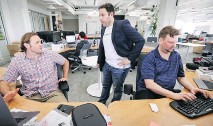When most people picture an astronomer, they think of a lone person sitting on top of a mountain, peering into a massive telescope. Of course, that image is out of date: Digital cameras have long since done away with the need to actually look though a telescope.
But now the face of astronomy is changing again. With the advent of more powerful computers and sky surveys that generate unimaginable quantities of data, artificial intelligence is the go-to tool for the keen researcher of space. But where is all of this data coming from? And how can computers help us learn about the universe?
AI’s appetite for data
Chances are you’ve heard the terms “artificial intelligence” and “machine learning” thrown around recently, and while they are often used together, they actually refer to different things. Artificial intelligence (AI) is a term used to describe any kind of computational behavior that mimics the way humans think and perform tasks. Machine learning (ML) is a little more specific: It’s a family of technologies that learn to make predictions and decisions based on vast quantities of historical data. Crucially, ML creates models which exhibit behavior that is not pre-programmed, but learned from the data used to train it.
The facial recognition in your smartphone, the spam filter in your emails, and the ability of digital assistants like Siri or Alexa to understand speech are all examples of machine learning being used in the real world. Many of these technologies are now being used by astronomers to investigate the mysteries of space and time. Astronomy and machine learning are a match made in the heavens, because if there’s one thing astronomers have too much of — and ML models can’t get enough of — it’s data.
We’re all familiar with megabytes (MB), gigabytes (GB), and terabytes (TB), but data at that scale is old news in astronomy. These days, we’re interested in petabytes (PB). A petabyte is about one thousand TB, a million GB, or a billion MB. It would take around 10 PB of storage to hold every single feature-length movie ever made in 4K resolution — and it would take over a hundred years to watch them all.
READ MOREhttps://astronomy.com/news/2022/07/how-artificial-intelligence-is-changing-astronomy






 FANTASIA
FANTASIA